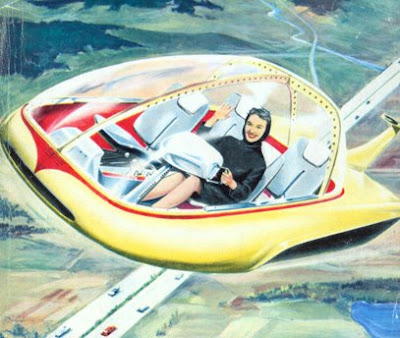 Just realized I posted a couple of other places but not here - sorry! I was on NPR this morning, talking about how accurately science fiction predicts the future (and how that's not really what SF tries to do) in a piece entitled, "What did science fiction writers predict for 2012?" In 1987, L. Ron Hubbard challenged his fellow science fiction writers to forecast what the world would be like in 25 years. Then they put together a "time capsule" of letters to us, now, that was just opened.
Just realized I posted a couple of other places but not here - sorry! I was on NPR this morning, talking about how accurately science fiction predicts the future (and how that's not really what SF tries to do) in a piece entitled, "What did science fiction writers predict for 2012?" In 1987, L. Ron Hubbard challenged his fellow science fiction writers to forecast what the world would be like in 25 years. Then they put together a "time capsule" of letters to us, now, that was just opened.Here are those predictions, and here's the Salon article about them, written by AlterNet's futurist editor, Sara Robinson.
The show was live this morning from 11:20am - noon on Minnesota Public Radio's Daily Circuit, and is now available for streaming on their website.
Didn't get a chance to call in during this morning's show? Share your thoughts on what the world will look like in 25 years on the Daily Circuit blog.
At the end of the conversation, the show's host, Kerri Miller, asked us to send our predictions for 2040. Here I go. My prediction for 2040:
 A few years after the time-capsule predictions we discussed today, in 1993, mathematician and SF author Vernor Vinge wrote the seminal essay, "The Coming Technological Singularity: How to Survive in the Post-Human Era." He stated that, "Within thirty years [by 2023], we will have the technological means to create superhuman intelligence. Shortly after, the human era will be ended."
A few years after the time-capsule predictions we discussed today, in 1993, mathematician and SF author Vernor Vinge wrote the seminal essay, "The Coming Technological Singularity: How to Survive in the Post-Human Era." He stated that, "Within thirty years [by 2023], we will have the technological means to create superhuman intelligence. Shortly after, the human era will be ended."This is arguably the single most-important concept that SF authors have had to address ever since the concept became widely known. All near-future SF written today must take the Singularity into account, whether the author believes it will happen or if she explains how the combination of rapidly accelerating advances in biotechnology, nanotechnology, and artificial intelligence will change civilization on Earth, the Earth itself, and what it means to be human. In other words, will we reach the Singularity? If not, what devastating events brought our ever-accelerating technological advances to a halt? If we do, how will the human species remain relevant? What will it mean to be human in a world of superhuman intelligences, ubiquitous information and information-processing (both within and around us, via biotech and nanotech) that work like magic? Will humans resist this change - which might feel like marginalization - so hard that we destroy our civilization and, perhaps, become extinct without ever having invented Terminator-like AI killing machines?
This is what much of today's SF explores, because we will face these things by the year 2040, no matter how much some people want to stop progress or change. How SF most affects the future is not in its prediction or even that it encourages positive outcomes, but rather in the negative outcomes it helps prevent:
- The environmental movement was fertilized by SF stories set on a ruined Earth.
- Nevil Shute’s SF novel and film On the Beach and the TV movie The Day After probably helped us avoid nuclear war.
- Orwell's 1984 might have helped us avoid tyranny of that sort, and we can only hope that Margaret Atwood's The Handmaid's Tale helps us avoid that one.
So we ask, What are people's greatest concerns today? We might answer, "Climate change, disease, energy and water depletion, economic collapse" and so on. All these are important challenges we must overcome, so these are what today's SF authors explore in their work, just as the authors from the time capsule reflected what was on the minds of people in 1987. But the most-fundamental issue at hand in the next 25 years is this:
What will it mean to be human in a post-Singularity world? How will we survive - free, happy, and fulfilled?
Best,
Chris





